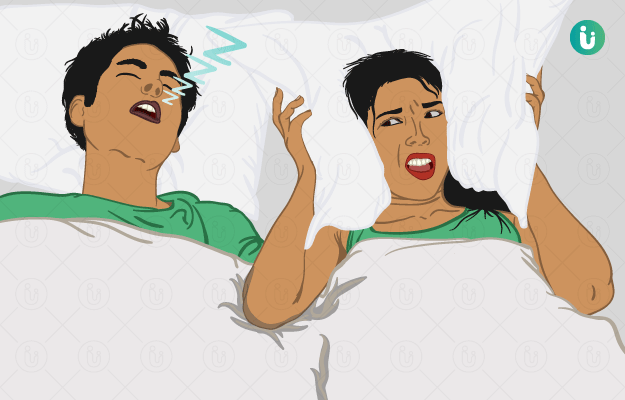What is snoring?
Snoring occurs when there is an obstruction to the free movement of air while sleeping. Those who snore often have too much throat and nasal tissue or floppy tissue that tends to vibrate, leading to the characteristic sound of snoring.
What are its main signs and symptoms?
Snoring causes sleep deprivation, daytime drowsiness, lack of concentration and decreased libido. It can cause psychological damage and an increased risk of heart attack.
What are the main causes?
Snoring is very common and usually isn’t caused by anything serious. When you are asleep, your tongue, throat, mouth, airways and lungs relax and become narrow. When these parts vibrate as you breathe, it results in snoring. Some of the common causes of snoring are:
- Allergy or sinus infection.
- Nasal deformities like deviated nasal septum or obstruction due to nasal polyp.
- Obesity.
- Thick tongue.
- Pregnancy.
- Genetic factors.
- Alcohol and smoking.
- Enlarged tonsils and adenoids.
- Certain drugs.
How is it diagnosed and treated?
Your doctor will check your nose and mouth for any reasons for snoring. Your partner is the best person to describe your snoring pattern. Your doctor may refer you to a specialist if the cause is not clear. You may be asked to get the in-home sleep test or in severe cases in-lab sleep test.
In the sleep study, the sensors are hooked at various parts of the body which record signals from brain, heartbeat and your breathing pattern. Obstructive sleep apnea is usually diagnosed with the help of a home sleep test called polysomnography. Sleep disorders apart from obstructive sleep apnea are diagnosed with in-lab sleep study at the study centre.
Chest X-ray, CT and MRI scan may be other tests ordered to diagnose the exact cause of snoring if a sleep study isn’t diagnostic.
Snoring cannot be completely stopped by one specific treatment but certain treatments can minimize breathing discomfort by clearing up the blockage.
Lifestyle changes, quitting smoking and avoiding alcohol and sedative medications before bedtime can reduce snoring. Usage of nasal sprays, strips or clips, oral appliances, special lubricant sprays, and anti-snore pillows and clothing can also help reduce snoring.
The doctor may advise the following for correction:
- Continuous positive airway pressure (CPAP)
- Laser-assisted uvulopalatoplasty (LAUP)
- Palatal implants
- Somnoplasty – using low levels of radiofrequency to remove excess tissues
- Custom-fitted dental devices or lower jaw-positioners
- Surgical procedures like uvulopalatopharyngoplasty (UPPP), thermal ablation palatoplasty (TAP), tonsillectomy and adenoidectomy
You can avoid snoring by sleeping on your side rather than your back, elevating your head and trying an anti-snoring mouth appliance.

 Doctors for Snoring
Doctors for Snoring  OTC Medicines for Snoring
OTC Medicines for Snoring
 Lab tests for Snoring
Lab tests for Snoring Snoring articles
Snoring articles

 Home Remedies for Snoring
Home Remedies for Snoring







 Dr. Laxmidutta Shukla
Dr. Laxmidutta Shukla











